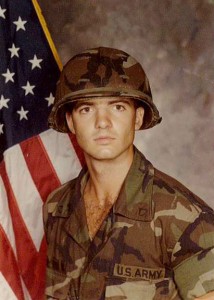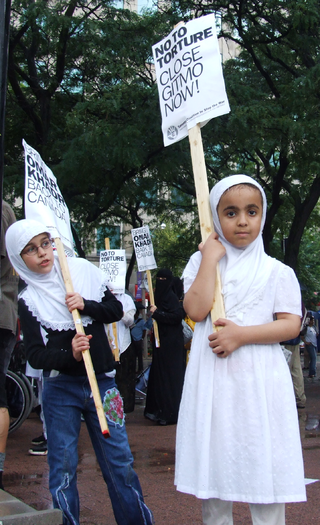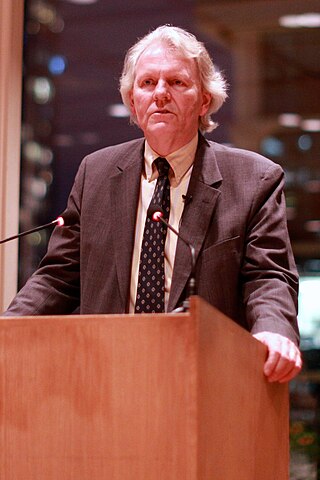Related Research Articles

Children in the military, including state armed forces, non-state armed groups, and other military organizations, may be trained for combat, assigned to support roles, such as cooks, porters/couriers, or messengers, or used for tactical advantage such as for human shields, or for political advantage in propaganda. Children have been recruited for participation in military operations and campaigns throughout history and in many cultures.
Maher Arar is a telecommunications engineer with dual Syrian and Canadian citizenship who has resided in Canada since 1987.
Children's rights or the rights of children are a subset of human rights with particular attention to the rights of special protection and care afforded to minors. The 1989 Convention on the Rights of the Child (CRC) defines a child as "any human being below the age of eighteen years, unless under the law applicable to the child, majority is attained earlier." Children's rights includes their right to association with both parents, human identity as well as the basic needs for physical protection, food, universal state-paid education, health care, and criminal laws appropriate for the age and development of the child, equal protection of the child's civil rights, and freedom from discrimination on the basis of the child's race, gender, sexual orientation, gender identity, national origin, religion, disability, color, ethnicity, or other characteristics.

Ahmed Saïd Khadr was an Egyptian-Canadian philanthropist with alleged ties to al-Qaeda in Afghanistan and Pakistan. His activity in Afghanistan began in response to the Soviet invasion of Afghanistan in 1979, and he has been described as having had ties to a number of militants within the Afghan mujahideen, including Saudi militant Osama bin Laden. Khadr was accused by Canada and the United States of being a "senior associate" and financier of al-Qaeda in Afghanistan.
The Khadr family is an Egyptian-Canadian family noted for their ties to Osama bin Laden and connections to al-Qaeda.

Layne Morris is a retired American special forces operative. On July 27, 2002, he was wounded and blinded in one eye during a gunfight in Afghanistan that left American combat medic Christopher J. Speer dead, allegedly at the hands of the Canadian accused terrorist Omar Khadr.
"A piece of the hand grenade shrapnel cut the optic nerve, so I'm blind in one eye."

Christopher James Speer was a United States Army combat medic and an armed member of a special operations team who was killed during a skirmish in Afghanistan on July 27, 2002. Speer, who was not wearing a helmet at the time because the mission called for indigenous clothing, suffered a head wound from a grenade and succumbed to his injuries approximately two weeks later. Omar Khadr was charged and convicted of throwing the grenade that killed Speer.

Omar Ahmed Said Khadr is a Canadian who, at the age of 15, was detained by the United States at Guantanamo Bay for ten years, during which he pleaded guilty to the murder of U.S. Army Sergeant 1st Class Christopher Speer and other charges. He later appealed his conviction, claiming that he falsely pleaded guilty so that he could return to Canada where he remained in custody for three additional years. Khadr sued the Canadian government for infringing his rights under the Charter of Rights and Freedoms; this lawsuit was settled in 2017 with a CA$10.5 million payment and an apology by the federal government.

Abdullah Ahmed Said Khadr is a Canadian citizen whose alleged ties to terrorism resulted in a protracted international legal issue. Born in Canada, he grew up in Pakistan. As the oldest son of Ahmed Khadr, who had ties to the Afghani Mujahideen, Abdullah was sent to the Khalden military training camp as a boy. As a young adult, he allegedly became an arms dealer, selling illicit weapons to militants involved in the War in Afghanistan and related conflicts.

Dennis Edney was a Canadian defence lawyer based in Edmonton, Alberta, Canada. Originally from Scotland, he was noted for his involvement in high-profile cases, including Brian Mills, R. v. Trang, as defence attorney for Abdullah and Omar Khadr, who were captured in the War on Terror, for Fahim Ahmad, and for representing the entire Khadr family. He also represented Canadian Abdulrahman El Bahnasawy charged in the US with plotting to carry out mass shootings of civilians at concerts, to bomb New York Times Square, and to bomb the city's subway system.

Michelle Shephard is an independent investigative reporter, author and filmmaker. She has been awarded the Michener Award for public service journalism and won Canada's top newspaper prize, the National Newspaper Award, three times. In 2011, she was an associate producer on a documentary called Under Fire: Journalists in Combat. She produced the National Film Board documentary, Prisoners of the Absurd, which premiered at Amsterdam's film festival in 2014. Shephard also co-directed a film based on her book about Omar Khadr, Guantanamo's Child, which premiered at the Toronto International Film Festival in September 2015.

A Canadian of Egyptian and Palestinian descent, captured by American forces in Afghanistan at the age of 15, Omar Khadr was the last Western citizen remaining in custody in Guantanamo Bay. Canada refused to seek his extradition or repatriation despite the urgings of Amnesty International, the Canadian Bar Association, and other prominent organisations. His lawyer Dennis Edney has summarised the differential response towards Khadr stating that "one of the problems" with defending the youth is that he's a member of the Khadr family rather than "a Smith or an Arar"
The Canadian Children's Rights Council Inc. (CCRC); is a non-governmental organization that is based in Toronto, Ontario, Canada and was founded in 1991. The CCRC describe themselves as a nonprofit, educational and advocacy organization dedicated to supporting the rights and responsibilities of Canadian children and providing critical analysis of governments' policies at all levels of government in Canada.

You Don't Like The Truth: Four Days Inside Guantanamo is a 2010 documentary. The film focuses on the recorded interrogations of Canadian child soldier Omar Khadr, by Canadian intelligence personnel that took place over four days from February 13–16, 2003 while he was held at Guantanamo. It presents these with observations by his lawyers and former cell mates from the Bagram Theater Internment Facility and Guantanamo Bay detention camps.
Solomon Islands is a sovereign country in Melanesia consisting of many islands with a population of 561,231 (2013). It became self-governing from the United Kingdom in 1976 after three previous attempts at forming a Constitution. The Constitution of Solomon Islands was enacted in 1978. This however led to conflicts between cultures and armed conflict in the late 1990s forced a review of the 1978 Constitution. This review resulted in the Federal Constitution of the Solomon Islands Bill 2004 (SI) and various other amendments. The Human Rights Chapter, however, remained unchanged.
UNICEF Australia convenes the Child Rights Taskforce, Australia’s peak child rights body made up of almost 100 organisations, advocating for the protection of child rights in Australia. Its goal is to lead the sector-wide approach to the UN on how we think the Australian Government is faring in its commitment to children.
Children's rights in Malaysia have progressed since Malaysia acceded to the Convention on the Rights of the Child (CRC) in 1995 and introduced the Child Act in 2001.

Michael J. Prince is a Canadian political scientist and public policy and administration scholar. Prince is the Lansdowne Professor of Social Policy at the University of Victoria in Canada.
According to a 2012 survey by Statistics Canada, around 3.8 million adult Canadians reported being "limited in their daily activities due to a disability". This represented 13.7% of the adult population. The three most-prevalent forms of disability in Canada are chronic pain issues, mobility, and flexibility limitations. Around 11% of Canadian adults experience one of these disability types, and 40% of those people have had all three at the same time. Disabled people in Canada have historically experienced many forms of discrimination and abuse, such as segregation, institutionalization, and compulsory sterilization. They were not given the same rights as non-disabled people until the end of the 1970s, when the Coalition of Provincial Organizations of the Handicapped initiated significant changes. Legislation intended to protect disabled Canadians include the Charter of Rights and Freedoms, the Canadian Human Rights Act, and the Employment Equity Act.
References
- ↑ Robert Brian Howe (2007). "Introduction". In Katherine Covell; Robert Brian Howe (eds.). A Question of Commitment: Children's Rights in Canada. Wilfrid Laurier University Press. p. 16. ISBN 978-1554580033.
- ↑ Susie Veroff (2008). "Canada". In Irving Epstein; Leslie Limage (eds.). The Greenwood Encyclopedia of Children's Issues Worldwide. Greenwood Publishing Group. p. 93. ISBN 978-0313336171.
- ↑ Erica Burman (2008). Deconstructing Developmental Psychology. Routledge. p. 170. ISBN 978-0415395618.
- ↑ Michael J. Prince (2006). "Canadian Disability Policy: Still a Hit-and-Miss Affair". In Jeff Keshen; Raymond Benjamin Blake (eds.). Social Fabric or Patchwork Quilt: The Development of Social Policy in Canada. University of Toronto Press. p. 440. ISBN 1551115441.
- ↑ Aisling Parkes (2013). Children and International Human Rights Law. Routledge. p. 345. ISBN 978-1135085193.
- ↑ Christof H. Heyns; Frans Viljoen (2002). The Impact of the United Nations Human Rights Treaties on the Domestic Level. Martinus Nijhoff Publishers. p. 123. ISBN 9041117199.
- ↑ Paula Reid (December 27, 2007). "Unhappy birthday for youth rights". Toronto Star . Retrieved December 4, 2013.
- ↑ Aaron Wherry (November 13, 2009). "The Commons: 'This is an exceptional case'". Maclean's . Retrieved December 4, 2013.
- ↑ "Child Rights Award". Canadian Coalition for the Rights of Children. Archived from the original on 2019-03-21. Retrieved 2019-03-21.
- ↑ J. Marshall Beier (2011-11-16). "Introduction: Everyday Zones of Militarization". In J. Marshall Beier (ed.). The Militarization of Childhood. Palgrave Macmillan. p. 4. doi:10.1057/9781137002143_1. ISBN 978-1137002143.
- ↑ Noah Kenneally (2017). "Doing Children's Rights: Moving beyond Entitlements and into Relationships in Canadian Contexts". In Xiaobei Chen; Rebecca Raby; Patrizia Albanese (eds.). The Sociology of Childhood and Youth in Canada. Canadian Scholars. p. 339. ISBN 9781773380186.
- ↑ Tracy Sherlock (2018-12-09). "Gen Squeeze makes a leap into defending environment". National Observer . Retrieved 2019-03-21.
- ↑ Ainslie Cruickshank (2018-12-12). "Scrapping carbon pricing would discriminate against young Canadians, group argues". Toronto Star . Retrieved 2019-03-21.